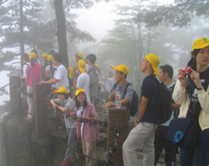
China is holding more public hearings on ticket price adjustments on nationwide tourist sites, introducing more public opinions and suggestions.
The hearings follow price hearings on train tickets, water and electricity and environmental protection, after China issued provisional regulations on the public hearing system for price-related governmental decisions in 2001.
A hearing in Beijing in November last year focused on disputed ticket price changes for six world heritage sites, including the Forbidden City and the Summer Palace.
"The main reason for the price rise lies in the financial pressure for relics preservation. Ticket revenue has to cover most operational costs in China's world heritage sites since governmental allocation covers only 30 percent," said Li Gao, Assistant Director of the Summer Palace. "The price rise is also expected to control the excessive tourist flow."
The plan to raise ticket price of the six sites immediately triggered protests from the public, making it necessary to hold a hearing.
Similar hearings have mushroomed nationwide on various topics.
The scenic Huangshan Mountain in east China's Anhui Province, for example, also decided to hold a hearing in March on ticket prices.
The hearing invited officials from the People's Congress of the city, the municipal government, representatives of tourist companies, experts and six tourists randomly chosen from the applicants.
All 23 representatives, including five of the six tourists, agreed to raise the ticket price of Huangshan Mountain, but they disagreed on how much the price should be raised, said Zhang Jiaxing, director of the Price Proof Center of Huangshan.
About 72 percent of the representatives suggested to raise the price by 50 percent, which became the final decision of the city’s Price Bureau. The price will jump from 130 yuan (US$15.7) to 200 yuan (US$24.2) in the busy season and from 85 yuan (US$10.3) to 120 yuan (US$14.5) in the low season.
Zhang said the price change was 20 percent lower than the government's former plan and that the new ticket price plan will take effect from June.
In central China's Hunan Province, when it was planned to raise ticket prices for the Yuelushan Scenic Spot, a public opinion poll was carried out within Changsha, the city where the scenic spot is located.
The poll aimed to build a bridge of exchanges between the local government and the people, said Liang Naiwen from the Public Opinion Poll Center of Hunan Provincial Statistics Bureau.
Xiamen, a scenic city in Fujian Province in southeast China, plans to raise its ticket price from three yuan (US$0.36) to 50 yuan (US$6.1) of its Gulangyu scenic spot, an ellipse-shaped island with an area of 1.84 square kilometer and also a residence area.
Strong public opinion from both the public and experts have compelled the local government to revise the plan. The Tourism Bureau of Xiamen City said that in order to make better preparations, the final hearing will be held postponed, and the present price will remain during the May Day holidays.
Several scenic spots, including central Sichuan Province's Leshan Buddha, Huangguoshu of southwest China's Guizhou Province and Lushan Mountain of Jiangxi Province in east China, have announced their intention not to raise ticket prices as a result public hearings.
Similar hearings have followed in recent months involving Wudang Mountain in central China's Hubei Province, Zhangjiajie scenic spot of central China's Hunan Province and Jiuzhaigou of Sichuan Province.
Though some have doubted whether the representatives would reflect the common people's opinions in price hearings, there has been a popular understanding among sociologists that during China's process of perfecting its market-oriented economy system, price hearings on tourist spots, train tickets, water and electricity price have shown improved democracy.
The society's supervision will help make governmental price decisions more scientific and transparent and promote the democratization and standardization of governmental decisions, said Zhou Hanhua, professor of the Institute of Law Science of Chinese Academy of Social Sciences.
"China has received about 100 million international and about 930 million domestic tourists last year, and it's important for the country make the procedures more scientific in fixing ticket prices in tourist sites," said Wang Kaiyu from Anhui Provincial Academy of Social Sciences.
In order to strengthen supervision over ticket price rise, China has sent a draft circular to improve the administration on ticket prices changes to all relevant provincial departments for discussion.
(Xinhua News Agency May 6, 2005)
|

